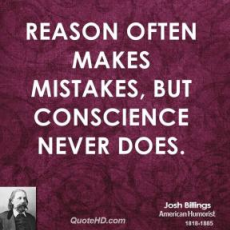
Another approach to Conscience is reason based, the idea that we can use reason to determine what is right and what is wrong. This view is largely supported by Psychologists.
Reason based Conscience (Aquinas and the Psychologists, Freud, Piaget and Fromm)
St.Thomas Aquinas
Aquinas saw conscience as our natural ability to distinguish right from wrong, a view subsequently taken by the Catholic Church.
“Conscience is reason making right decisions.” – Conscience based on reason.
Synderesis Rule – Like an ability, to be able to distinguish between right and wrong. It has to be trained. People have the ability to do right but don’t necessarily.
Conscientia – The part of your conscience that uses reason and makes the practical moral decision.
Thus conscience will only give you the right answer if trained correctly.
Aquinas believed that you should follow your conscience only if it is trained correctly so if you do something evil it means that you have not trained your conscience properly. In this instance we would be following an ‘apparent good’ rather than a ‘real good’ so if we grow up around people stealing we may think it is right (an apparent good).
Evaluation:
This approach is too rationalistic, it ignores the fact that revelation comes from God. You are relying on your reasoning to make ethical decisions; should God wish to talk to us directly?
For secular people there is no need to involve a deity, their conscience is arguably no different to religious believers.
With Newman, Augustine and Butler it is God’s fault if we do wrong (God-given conscience) but with Aquinas this is not the case, preserves the image of a good God.
However Aquinas puts too much faith in humanity with his idea of real and apparent goods - how can we explain Genocide? Surely this is truly evil.
W.D.Ross says emotions have a place in moral decision making e.g. when we see Genocide it is upsetting and we know it is wrong, you cannot mistake it as an apparent good.
What do you do when reason and the Bible conflict? Aquinas would say that you haven’t trained your conscience properly if it contradicts God’s revelations, yet the Bible contradicts itself in places; for example the Old Testament portrays violence as “an eye for an eye, a tooth for a tooth” yet the new Testament encourages pacifism – “live by the sword, die by the sword.”
Sigmund Freud (1856-1939)
He viewed the guilty conscience as an internalisation of anger and disapproved of others that causes the conflict and must be addressed.
Oedipus complex, boys sexually attracted to their mothers and jealous of the dad. Emotions repressed.
Conscience is based on this guilt and repressed emotions.
Our experiences make us what we are, they decide our path. There can’t be any universal moral law as our individual consciences are shaped by our own experience.
Laws and moral codes are created by people’s experiences.
Freud’s research is too narrow and has been criticised as thus – it cannot be generalised.
Jean Piaget (1896-1980)
Conscience is developed over time, not something we are born with.
Piaget was a child psychologist and not a philosopher but he did comment on the conscience in children; said moral development grows and the ability to reason morally. He deduced 3 stages:
Pre-Moral (0-3 years)
Very little concept of morality.
Heteronomous Morality (5-10 years)
If a child acts well it is for praise, not out of goodness. Same applies for punishment, a child will not do bad to avoid punishment, not to be good – an immature conscience.
Autonomous Morality (10 years+)
When the children develop their own rules and understand how rules operate in and help society. The move towards autonomous morality is when the child is less dependant on other’s moral authority.
For example a ten year old may stop bullying not because he wants to be praised but because he realises it is good morally.
Lawrence Kohlberg, similarly to Piaget, stated that thinking behind moral judgements is crucial in determining the child’s level. So most children believe it wrong to break the law but if it is ‘because it is wrong’ that would suggest a low level of moral development. Both Piaget and Kohlberg believed social interaction enhanced moral development.
There are many criticisms of Piaget stating that his experiments were flawed as the data was based on a poor sample.
Piaget said children just react and focus on the outcome but Nelson’s research contradicts this.
Piaget assumed that a child’s behaviour would match their beliefs.
Eric Fromm (1900-1980)
Fled from Germany to New York after the Nazi takeover.
Held a secular view on conscience but believed God could fit in.
He first explained an authoritarian conscience from what he witnessed in Nazi Germany but later considered a humanistic conscience during his time in America.
Authoritarian:
Formed from authority figures.
Rules internalised by young children and set these as our morals as they reflect the rules of the place they live in.
Not following these is what causes our guilt e.g in Nazi Germany most people submitted to authority.
It’s a reaction of ourselves to ourselves.
We experience values.
Goes above laws, we know/feel when we aren’t doing the right thing.
The conscience is our real, true individual.
Can run in parallel with Authoritarian e.g. some people defied the Nazis and helped the Jews.
When you are in two minds that is the two consciences fighting one another.
Evaluation:
Aims to develop individuals, be a virtuous person.
Judges our success as a human being, helps us realise our full potential.
However, the Authoritarian conscience is very inhumane.
Fromm gives no explanation of the source of the humanistic conscience, can we associate this with God? Thus Fromm does not full develop the idea of the humanitarian conscience.
IMAGE: http://www.quotehd.com/imagequotes/authors4/tmb/josh-billings-comedian-reason-often-makes-mistakes-but-conscience.jpg

0 Comment:
Be the first one to comment on this article.